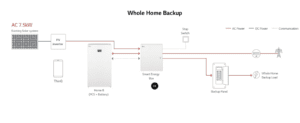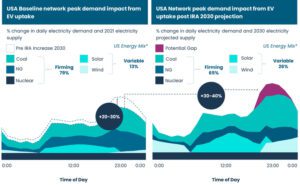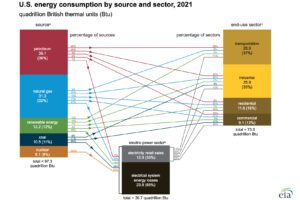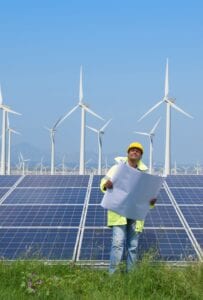electrification
-
Interview
The POWER Interview: Energy Storage for Commercial, Residential Electrification
Energy storage systems (ESS) are expanding far beyond the batteries being deployed at power plants, at substations, in microgrids, or at locations along the power grid to support the electricity transmission and distribution network. Systems for commercial and industrial enterprises, and increasingly by homeowners for residential use, are helping lead the expansion of energy storage. […]
-
Power
New Study Finds Electrification Reduces Emissions and Improves Air Quality
A group of researchers found that “Adopting electric end-use technologies instead of fossil-fueled alternatives, known as electrification, is an important economy-wide decarbonization strategy that also reduces criteria pollutant emissions and improves air quality.” Findings from the study conducted by nine researchers—four from EPRI, four from Ramboll, and one from the Oak Ridge National Laboratory—were published […]
-
Power
Inflation Reduction Act: Increased Electrification and Resulting Utility Implications
While the Inflation Reduction Act (IRA) provides steps in the right direction by expanding renewable energy development and electrification incentives, it may also lead to a worsening duck curve and a larger proportion of variable power sources in the generation mix—putting significant pressure on utilities’ ability to maintain reliability. U.S. utilities need to be proactive […]
-
Electric Vehicles
Can the Power Grid Handle More EVs?
Only about 1% of the 250 million cars, SUVs, and light-duty trucks on American roads are electric vehicles (EVs). But that’s about to change. While it’s difficult to estimate future sales, an analysis by IHS Markit projects that up to 30% of new car sales could be electric by 2030, rising to up to 45% […]
-
Power
Biden Administration Targets Industrial Decarbonization Through Electrification, Low-Carbon Fuels, CCUS
The Biden administration has laid out a comprehensive roadmap to help five energy-intensive manufacturing sectors reduce their fuel- and power-related carbon emissions and achieve net-zero by 2050. The pathways proposed for the iron and steel, cement and concrete, food and beverage, chemical manufacturing, and petroleum refining sectors may have substantial implications for future power demand. […]
-
Commentary
Taking Advantage of the Climate Bill Through Holistic Home Energy
It’s an enthusing time in the energy world. The signing of the Inflation Reduction Act (IRA) has brought terms like “heat pumps” and “photovoltaics” into the national spotlight and homeowners’ vocabularies. One thing that’s flying under-the-radar: how both clean energy generation and efficient energy usage can come together for homeowners, landlords, and renters to save […]
-
Renewables
Renewable Energy, Electrification Big Winners in Inflation Reduction Act
The U.S. House on Aug. 12 passed a bill with major implications for the power generation industry, joining the U.S. Senate in supporting the Inflation Reduction Act (IRA). The bill, which now heads to President Joe Biden for his signature, includes major provisions to combat climate change, including support for a variety of clean energy […]
-
Legal & Regulatory
The Regulatory Structures or Economic Opportunities that are Driving—or Hindering—Building Electrification
Although the electricity generation and transportation sectors account for a far greater share of greenhouse gas emissions than the residential and commercial building sector, policy makers are targeting building electrification as a means for making a significant contribution to economy-wide emission reductions. Federal, state, and local governments are using various policy levers toward this goal, […]
-
Electric Vehicles
The POWER Interview: EVs Lead Charge for Electrification
Several groups are studying the impact of electrification on the U.S. power system, including the National Renewable Energy Laboratory (NREL) in Colorado and its research partners, which include the Electric Power Research Institute (EPRI), and national laboratories such as Lawrence Berkeley and Oak Ridge. NREL, as part of its Electrification Futures Study, has used what […]
Tagged in: -
Point-Counterpoint
Natural Gas Bans Expensive, and Would Impact Electric Grid Reliability
Major cities including San Francisco, Seattle, Denver, and New York have either enacted or proposed measures to ban or discourage the use of natural gas in new homes and buildings, just a few years after










